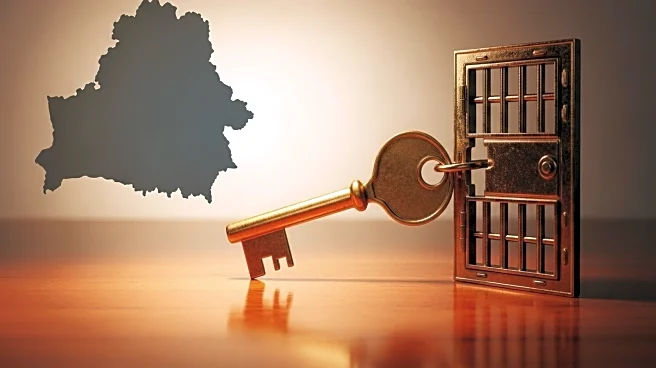What's Happening?
Belarus has released 52 political prisoners, including former presidential candidate Mikola Statkevich, following an appeal from President Trump. This move is part of a broader effort to improve relations between the United States and Belarus. The release was announced by Lithuanian President Gitanas Nausėda, who expressed gratitude to the US and President Trump for their involvement. The Trump administration has responded by easing some sanctions on Belarus's state-run airline, Belavia. The release of these prisoners, which includes foreign nationals from Lithuania, Latvia, Poland, Germany, France, and the UK, comes after discussions between Belarusian leader Alexander Lukashenko and US official John Coale. The talks also covered regional security issues, including the migration crisis affecting NATO countries.
Why It's Important?
The release of political prisoners in Belarus marks a significant step in the thawing of relations between Belarus and the United States. This development could lead to further diplomatic engagements and potential economic benefits for Belarus, as indicated by the easing of sanctions on Belavia. For the US, this move aligns with its broader foreign policy goals of promoting human rights and democracy. The release also highlights the influence of US diplomacy in Eastern Europe, potentially setting a precedent for future negotiations with authoritarian regimes. However, the situation remains complex, as over 1,000 political prisoners are still detained in Belarus, and the international community continues to monitor the country's human rights record.
What's Next?
The US may continue to engage with Belarus to secure the release of the remaining political prisoners. Further easing of sanctions could be contingent on Belarus's actions in this regard. Additionally, the US has expressed interest in reopening its embassy in Minsk, which could facilitate more direct diplomatic interactions. The international community, including human rights organizations, will likely keep a close watch on Belarus's compliance with international norms. The outcome of these developments could influence Belarus's relations with other Western nations and its position within the broader geopolitical landscape.
Beyond the Headlines
The release of political prisoners in Belarus raises questions about the ethical implications of negotiating with authoritarian regimes. While the immediate outcome is positive for those released, it may also embolden similar regimes to use political prisoners as bargaining chips in international diplomacy. This situation underscores the delicate balance between achieving short-term humanitarian goals and maintaining long-term commitments to democratic principles and human rights.










